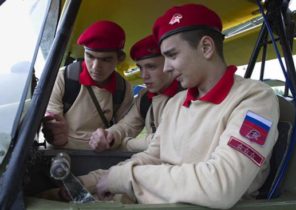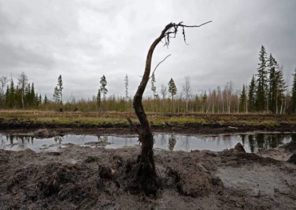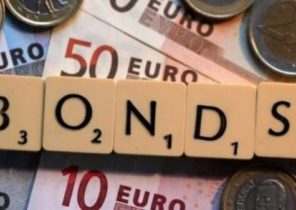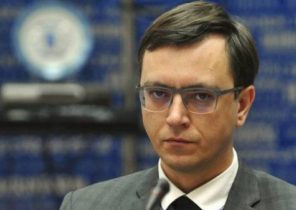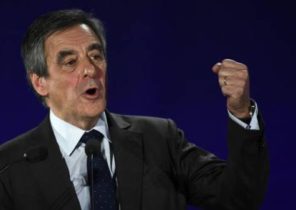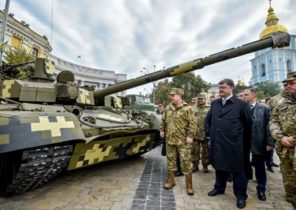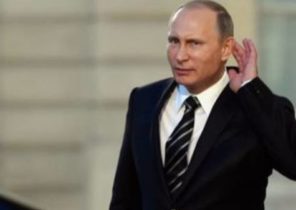
What are the main successes and failures of Russian domestic and foreign policy, and what are the main socio-economic results in 2016? On issues RFI on New year’s eve said the three experts.
Foreign policy
According to the politician and economist Vladimir Milov, positive outcomes in Russian foreign policy in 2016 is almost impossible to find.
— Still, Russia has continued to remain in isolation, and any breakthrough is not achieved, even in traditionally friendly directions. For example, we now see the summit of the Eurasian Union, where there is no Lukashenka, and a lot of criticism of the Union of Belarus official is heard now. And Kyrgyzstan even kicking. Were separate things accomplished in cooperation with China, but again a strategic Alliance that authorities advertised — it is very far from it. Very long was heated to a visit to Japan, but it ended in nothing at all.
RFI: are the victory of Pro-Russian candidates in Moldova and Bulgaria, as well as the projected success of the Fillon in France cannot be attributed to Russia’s foreign policy achievements?
In Moldova and Bulgaria government system of government, so these victories have a certain symbolic significance, but to say that they will be able to convert to the arrival of Pro-Moscow forces in the government — most likely, on the contrary, it can evoke a defensive response. As we have seen, for example, in Austria, where even people of conservative views, voted for the ecologist. The results of the elections on 4 December in Austria say that there is some additional mobilization of those who do not want the coming to power of the divisive forces. So, I think it’s a Pyrrhic victory in Bulgaria and Moldova. But Austria shows that Europe is in big trouble. I see in France, because Fillon is a great chance to pull votes from Le Pen, a traditional ally of the Kremlin, which has largely bet, and which now, as the Western press informs, financial problems arose. That raises the question, whether in the Kremlin it on to support?
— Maybe now bet on another candidate?
— Putin made an obvious bid for Le Pen in France is the most friendly party for the current Russian policy. Tactically the victory of Fillon in the presidential election Putin can do anything. On a tactical issue of sanctions, he certainly is a friendly candidate. And on the strategic question of the unity of Europe Fillon — not an ally of Russia.
What about the OPEC agreement?
— This agreement is four times smaller in volume than in 2008. And, unlike that period, it’s too smeared between small players. Saudi Arabia has assumed a relatively small obligations, Iran did not take Iraq also took quite small. I’m in this deal do not believe it is, I think, was made with only one purpose: tactical support prices, but pretty soon it will be clear, plus the fact that the prices went for $ 50, has led to a noticeable recovery of the us production, and we the market will see in the coming months. In my opinion, this deal has no real value for the oil market.
So, success in foreign policy, you see, and what in your opinion, the biggest failure?
— I think the biggest failure was the fact that the direct intervention of Vladimir Putin in the internal politics of Western countries became obvious. I think this will have very serious consequences, will be a factor in domestic politics and voting. In Europe it will be very important, because the attitude of Putin’s Russia is generally negative.
— What, in your opinion, will be the main Russian foreign policy tendency in 2017?
— 2017 will be an arena of struggle of new forces committed to a redistribution of the Western order, with the traditional forces, who will be forced to regroup and mobilize. I personally believe that 2017 will be the year of revenge traditional politicians and, above all, in Germany. While Putin, of course, connected with many upcoming primarily elections to the European hopes. Apparently, we are witnessing the beginning of a long period of tug of war.
— What happens in Syria?
— It seems that somehow resigned to the fact that Syria will have to make some truce with the participation of all parties. I think, anyway, to stop all this bloodshed, they will agree, at least on a temporary agreement, part of which is Assad. He will remain under the control of the territory. I think that in 2017, ISIS will finish.
— Keeping power by Assad can be considered a success in Russia?
— Maybe only as a tactical success. Because the price of preserving Assad in power were overly large. This is a very delicate balance, and the only thing it provides is the presence of the Russian army. As we know from historical experience, and in fact it is clear that this entails costs, and the question of our withdrawal from Syria will arise sooner or later.
Domestic policy
The main political trend of the year — a decrease of controllability and degradation of the vertical in terms of narrowing the resource base, said political analyst associate Professor at the Institute of social Sciences of Ranepa Catherine Shulman.
— Everyone tries to get a piece of the resource and the resource becomes smaller. At the end of last year, I identified three trends you should monitor. The first point, situational protest, mainly urban, although not exclusively. Associated with urban issues — as capital repairs, utilities, fees, taxes, commercial services, demolition, cutting, building. This is the type of event that was significant in 2016, and, in my view, must be meaningful in 2017. the Second type of events — the war with the security forces plus Chechnya, exacerbated by intraspecific competition. And the third is the attempt of the system to reform itself. I can say that my classification was correct.
But something certainly was a surprise for you…
— Of a sudden, what happened in 2016, I would call the results of the parliamentary elections, which was unexpected from the point of view of the system. Here is the orders of the Kremlin to conduct election campaign, as it was called in the official language, “fair, open and competitive”, it is necessary to understand it as “to hold it more decently, than in 2011”. To avoid at least demonstrative of violations, which in 2011 led to mass protests. These conversations were a number of regions ignored. Obviously, the Federal political management wanted a different result. Four or five fractions can be, without a constitutional majority “an United Russia”. That is, a more than decent result, which would allow to say: look, the level of competition has increased enormously, we do democracy more than the rest of the world. But a number of regions, especially the national republics, decided not to listen to all the Kremlin talks, held elections the way they used to hold them. And as a reward got a lot more mandates.
And the second is the ultra low turnout in the Central areas of cities in Russian regions. Exposing the rift between the subjects of the Federation, which is quite thoroughly masked. Roughly speaking, in the cities no one came to vote. And of those few who came, very few people wanted to vote for “United Russia”. In the end, mandates were received by those regions where the turnout and the result is formed without the participation of the voters. The composition of the Duma was quite heavily skewed in that direction. Over time it may manifest itself, especially considering that half of the Duma is a single-seat districts, which are required for regional interest groups to a much greater extent than the Central administration.
— What to expect from the political agenda in the context of the election period?
— The election agenda is important to us, although it is commonly believed that elections are fake and the result is they are predictable. The result is predictable, and the consequences of not. It is a known paradox of authoritarian elections. For our political system the pre-election period — the time when she is trying to hear a public inquiry and once to answer it. And change of social demand is a further important trend of the outgoing year. People are increasingly concerned about everything that concerns the deterioration of quality of life.
— Is this a surprise?
— The surprise is the extent to which the citizens quickly tired of the subject of foreign policy. People are just annoyed by the fact that in conditions, when life is becoming harder and worse, we are constantly engaged in some adventure in countries with exotic names. I think that the recent tragic events reinforce this mood. No wonder after the crash all the main efforts of the propaganda machine intended to turn the conversation to how someone is wrong is grieving, or not grieving, but rejoicing. There are some phantoms, some imaginary rejoicing Ukrainians, some imaginary Bozhena Rynska, which is something not written. Let’s discuss the parade of ghosts, instead of trying to see something that sticks out in front of us.
The socio-economic situation
The position of the Russian economy in 2016 had improved somewhat compared with the previous year, says a corresponding member of RAS, head of Department, Institute of world economy and international relations RAS Sergey Afontsev. However, the accelerated fall in real incomes.
— The figures are certainly better than last year on a number of parameters. And dynamics of GDP and dynamics of industrial production and on the dynamics of investment. The main factors are two: first, low base because last year and the year before was really a very deep shock effects on the Russian economy, and from a low base to fall, of course, difficult. And the second factor, which is very strong this year, we have supported is the recovery, at least partial, of the oil prices. It does not provide access to the parameters that we had in the previous two years, but the scale of the crisis tendencies smoothed. Upset with the continuing fall in real incomes. And this is the main factor that undermines the potential recovery in domestic demand and overall economic optimism in society.
— If we assume that oil prices will continue the positive momentum, and at favorable development of events the West will relieve Russia of the sanctions, it will radically change our economic situation?
— If very roughly speaking, then, the crisis in two thirds was due to the fall in world prices, and not only oil, but in General for raw materials. And at about one third the impact of sanctions. The agreement, which is now achieved through the regulation of oil prices is certainly a positive information field for the Russian economy. Another thing is that we don’t know how in the short term the markets will react to these agreements given the fact that optimism and a stock of good news in the oil market settled. And it is unclear as in the beginning of next year oil prices will behave. As for the sanctions, of course, there are expectations, hopes, in this regard, expressed quite bold. From the standpoint of medium-and long-term, limiting access to foreign financial resources — it was a very powerful blow to the economy of the country. And if you restore the access to at least the American financial market, of course, the relief will be quite significant. Another thing is that the effect is not immediate. But even at the level of symbolism this is a very positive factor. On the other hand, the expectation of a positive background will spur shale companies to expand drilling activity and, accordingly, with a lag of six months to a year and a half will lead to the expansion of oil extraction from shale deposits. Of course, this is an additional factor of pressure on prices.
— In your opinion, how likely in 2017, the reduction of power rating because of the socio-economic situation?
I’d say that’s highly unlikely. That is, I would estimate it at 5-10%. Popularity of the government can threaten further acceleration of the decline in real income. If we say that the presidential election is still a year and a half, the continuation of these trends, can the power be very upset.
Meanwhile, at the end of the year, the approval rating of the President of Russia reached the annual maximum, representing 86.8%. These are the results of poll conducted on 24-25 December, after a press conference of Vladimir Putin.
